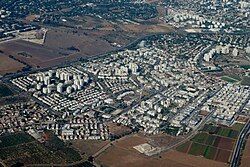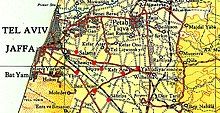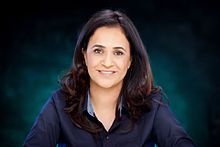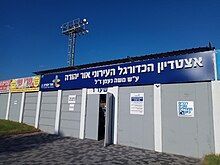Or Yehuda
Or Yehuda
אוֹר יְהוּדָה | |
|---|---|
| Hebrew transcription(s) | |
| • ISO 259 | ʔor Yhuda |
 | |
| Coordinates: 32°01′50″N 34°51′12″E / 32.03056°N 34.85333°E | |
| Country | |
| District | |
| Founded | 3500 BCE (Earliest settlement) 2000 BCE (Biblical city of Ono) 1955 (Israeli city) |
| Government | |
| • Mayor | Liat Shochat |
| Area | |
• Total | 6,500 dunams (6.5 km2 or 2.5 sq mi) |
| Population (2022)[1] | |
• Total | 38,854 |
| • Density | 6,000/km2 (15,000/sq mi) |
| Ethnicity | |
| • Jews and others | 99.8% |
| • Arabs | 0.2% |
| Name meaning | Judah's Light |
Or Yehuda (Hebrew: אוֹר יְהוּדָה, Arabic: أور يهودا) is a small city in the Tel Aviv District of Israel. Located in the area known as Gush Dan, in 2022 it had a population of 38,854.[1]
History
[edit]Prehistory
[edit]Human settlement back to the Chalcolithic has been found on the site.[2]
Antiquity and Bible
[edit]Or Yehuda is located on the site of the biblical town of Ono.[3][4] The name was used by Canaanites and then by Israelites as well (1 Chronicles 8:12), all throughout the First and Second Temple periods. Jewish classical writings mention the city as being formerly enclosed by a wall.[5]
Ottoman period
[edit]The built-up area of two Muslim Arab villages, Kafr 'Ana in the east[6] and Saqiya[7] to the west, are located within the current Or Yehuda city limits. Both villages date back to at least the 16th century, when Suleiman the Magnificent's haseki sultan, Roxelana aka Hürrem Sultan, endowed them to her Jerusalem soup kitchen.[8] During the 18th and 19th centuries, the area belonged to the nahiyeh (sub-district) of Lydda that encompassed the area of the present-day city of Modi'in-Maccabim-Re'ut in the south to the present-day city of El'ad in the north, and from the foothills in the east, through the Lod Valley to the outskirts of Jaffa in the west. This area was home to thousands of inhabitants in about 20 villages, who had at their disposal tens of thousands of hectares of prime agricultural land.[9]
British Mandate
[edit]In the 1931 census of Palestine conducted by the British Mandate authorities, Kafr 'Ana had a population of 1,824 Muslims in 449 houses[10] and Saqiya 663 Muslim inhabitants in 142 houses.[11]
1948 war
[edit]
In the end of April 1948, the Haganah launched military operation Hametz, which aimed to conquer several villages inland from Jaffa to isolate it from the Arab hinterland. The fate awaiting the inhabitants was not made explicit, other than stating the inhabitants would be allowed to leave, but a general order envisaged 'cleansing the area' (tihur hashetah) and the villages of Kafr 'Ana and Saqiya were depopulated.[12]
State of Israel
[edit]Temporary accommodation (1949-1955)
[edit]In 1949, immigrants from Libya and Turkey settled in the ruins buildings[dubious – discuss] of the villages of Saqiya and Kafr 'Ana, which did not have water or sewage infrastructure.[13][14]
In 1950–1953, the ma'abarot (provisional settlements for immigrants) Saqiya A, Saqiya B, Kafr 'Ana A, and Kafr 'Ana B were established on the previous village lands. These ma'abarot housed mainly immigrants from Iraq who arrived as part of Operation Ezra and Nehemiah.[15] Ma'abarot at the time were treated by authorities as temporary accommodations until permanent resettlement could occur on-site or elsewhere. Attempts to induce neighboring Tel Aviv and Ramat Gan to extend their municipal borders to cover these ma'abarot failed, and the ma'abarot residents resisted relocation to development towns in the north and south.[13] In 1952, the religious settlement of Ramat Pinkas (also known as Givat Hemed and Givat Mordechi)[dubious – discuss] was established for some of the ma'abarot residents.[citation needed]
Or Yehuda (est. 1955)
[edit]
The modern town of Or Yehuda was officially established by the State of Israel in 1955 and was named after Judah Alkalai. In 1962 Or Yehuda was recognized as a municipal planning authority, which led to increased development. In 1988, Or Yehuda was declared a city, due to the increase in the number of residents.
In April 2001, Hamas suicide bombers blew up a car in Or Yehuda, injuring eight people.[16]

In 2008, the Ef'al Regional Council was liquidated, and lands belonging to the council south of route 461, including Ramat Pinkas, were annexed to Or Yehuda.[17]
Demographics
[edit]According to the CBS,[citation needed] in 2001 the ethnic makeup of the city was 100.0% Jewish. In 2001 there were 13,900 males and 14,000 females. The population of the city was spread out, with 34.6% 19 years of age or younger, 17.7% between 20 and 29, 20.5% between 30 and 44, 15.8% from 45 to 59, 3.1% from 60 to 64, and 8.2% 65 years of age or older. The population growth rate in 2001 was 3.4%.
Economy
[edit]
Babylon Ltd., a developer of online translation programs that holds the Guinness World Record for the highest number of downloads of a language solution software, is based in Or Yehuda.[18] The headquarters of the National Roads Company of Israel is located in Or Yehuda.
Education and culture
[edit]
In 2000, Or Yehuda had 14 schools and a student enrollment of 5,147 students (10 elementary schools with 2,894 students, and 6 high schools with 2,253 students). 55.7% of 12th graders were entitled to a matriculation certificate in 2001.
In 1982, Or Yehuda was one of the first few cities to take part in the Program for Talented Youth in Mathematics, established by Professor Zvi Arad and Bernark Pinchuk, at Bar-Ilan University. Among the high-school students of Or Yehuda participating in this program was Boaz Tsaban, who proceeded to win national prizes for his achievements, and is now a Professor of mathematics at Bar-Ilan University.
The Babylonian Jewry Heritage Center, a museum documenting the history of the Iraqi Jewish community, was established in Or Yehuda in 1988.[19] The museum, located at Mordechai Ben-Porat Av No. 83, also includes a library (open to the public by appointment only).
Sports
[edit]
Football team F.C. Ironi Or Yehuda currently plays in the Liga Alef South Division, the fourth Israeli division. On 5 April 2019, they lost 5–1 to Hapoel Ramat Yisrael F.C. in the Liga Bet, but their goalkeeper Isaak Hayik, 73 years old, broke the Guinness World Record for oldest player.
Notable people
[edit]- Elida Gera (1931-2017), US-Israeli film director, dancer, and choreographer
- Isaak Hayik (born 1945), football player
- David Mena (born 1953), lawyer and former Likud member of the Knesset
Twin towns – Sister cities
[edit]Or Yehuda is twinned with:
 Charlottenburg-Wilmersdorf, Berlin, Germany
Charlottenburg-Wilmersdorf, Berlin, Germany Milwaukee, USA – sister city of Or Yehuda since 1978[20]
Milwaukee, USA – sister city of Or Yehuda since 1978[20]
See also
[edit]References
[edit]- ^ a b c "Regional Statistics". Israel Central Bureau of Statistics. Retrieved 21 March 2024.
- ^ Or Yehuda, Hadashot Arkheologiyot Volume 127 Year 2015, Felix Volynsky and Yoav Arbel, August 2015
- ^ "Or Yehuda". Carta's Official Guide to Israel and Complete Gazetteer to all Sites in the Holy Land (3 ed.). Jerusalem: Carta. 1993.
- ^ Taxel, Itamar (2013). "Rural Settlement Processes in Central Palestine, ca. 640–800 C.E.: The Ramla-Yavneh Region as a Case Study". Bulletin of the American Schools of Oriental Research. 369. American Schools of Oriental Research: 175. JSTOR 10.5615/bullamerschoorie.369.0157.
- ^ Mishnah (Arakhin 9:6)
- ^ Volynsky, Felix; Arbel, Yoav (2015-08-17). "Or Yehuda: Preliminary Report". Hadashot Arkheologiyot (127). Retrieved 8 September 2024. Neve Rabin quarter; see location map.
- ^ Khalidi, Walid (1992). All That Remains: The Palestinian Villages Occupied and Depopulated by Israel in 1948. Washington D.C.: Institute for Palestine Studies. p. 258. ISBN 0-88728-224-5.
- ^ Marom, Roy (2022-11-01). "Jindās: A History of Lydda's Rural Hinterland in the 15th to the 20th Centuries CE". Lod, Lydda, Diospolis. 1: 8–9.
- ^ Marom, Roy (2022). "Lydda Sub-District: Lydda and its countryside during the Ottoman period". Diospolis - City of God: Journal of the History, Archaeology and Heritage of Lod. 8: 103–136.
- ^ Mills, 1932, p. 14.
- ^ Mills, 1932, p. 15
- ^ Morris, 2004, p. 217
- ^ a b Gathering of the Exiles: It Became a Movie, YNET, July 2008[dead link]
- ^ "Or Yehuda Municipal History booklet" (PDF). Archived from the original (PDF) on 2014-08-21. Retrieved 2017-07-13.
- ^ Ma'Abara next to Tel-Aviv, Davar, November 1950.
- ^ "Suicide and car bomb attacks in Israel since the 'Declaration of Principles' in September 1993". Likud.nl. 2012-11-15. Retrieved 2013-04-30.
- ^ Bohus, Kata (2019-01-01). "Special Issue: Jews in Postwar Europe". Yearbook of the Dubnow Institute.
- ^ Translation co Babylon sets new Guinness record for downloads, Globes, 14 July 11
- ^ Iraq's Last Jews: Stories of Daily Life, Upheaval and Escape from Modern Babylon, T. Morad and D. Shasha
- ^ "Project Renewal: Or Yehuda". Jewishmuseummilwaukee.org. Archived from the original on 2012-05-17. Retrieved 2013-04-30.
External links
[edit]- Official website (in Hebrew)





